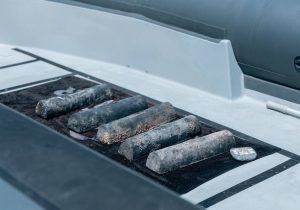 ©ABC
©ABC
Los arqueólogos del Ayuntamiento de Cullera, localidad perteneciente a la Comunidad Valenciana, ha encontrado seis lingotes de plomo del siglo I a.C en aguas de la bahía.
Estas piezas son iguales a las que se encontraron en el mes de octubre de 2021, los cuales aportaban importantes datos sobre la familia Planii, una de las más poderosas a nivel político y económico de la época romana.
El proyecto se está llevando a cabo gracias a la colaboración con el Club de Buceo Delfín, del Centro de Buceo de Cullera y del Centro de Arqueología Subacuática de la Comunidad Valenciana, que depende de la Generalitat.
Además, Kike Gandía, arqueólogo municipal del Ayuntamiento de Cullera advierte que las piezas pueden pertenecer a un cargamento hundido de lingotes de plomo que proceden de Carthago Nova (Cartagena), que se encontraban en ese momento, de camino a Roma, donde sus propietarios -los Planii-, venderían para fundirlos y convertirlos así, en herramientas, armas u otros útiles.
El equipo de arqueólogos destaca la relación del buen estado de conservación con la presencia del lodo del río Júcar, que permite una ausencia casi total de aire, haciendo que también sea escaso el contacto con el agua salina y los microorganismos que colonizan estos elementos. Todo ello permite que las piezas se encuentren casi como se fundieron, hace más de 2.000 años.
Debido a este hallazgo, el Museo de Historia y Arqueología de Cullera tiene, en su posesión, una de las mayores colecciones de lingotes de plomo con marca de los Planii y cronología romano-republicana más importantes de todo el Mediterráneo, situando al Portum Sucronem de Cullera en un puerto principal y destacado en el comercio mediterráneo de los siglos II a.C y II d.C.
__
ARCHAEOLOGICAL FIND IN THE BAY OF CULLERA
The archaeologists of the City Council of Cullera, a town belonging to the Valencian Community, have found six lead ingots from the first century BC in the waters of the bay.
These pieces are the same as those found in October 2021, which provided important data on the Planii family, one of the most powerful political and economic families of Roman times.
The project is being carried out thanks to the collaboration with the Club de Buceo Delfín, the Centro de Buceo de Cullera and the Centro de Arqueología Subacuática de la Comunidad Valenciana, which depends on the Generalitat.
In addition, Kike Gandía, municipal archaeologist of the City Council of Cullera warns that the pieces may belong to a sunken shipment of lead ingots coming from Carthago Nova (Cartagena), which were at that time, on their way to Rome, where their owners -the Planii-, would sell them to melt them and turn them into tools, weapons or other tools.
The team of archaeologists emphasizes the relation of the good state of conservation with the presence of the mud of the river Júcar, which allows an almost total absence of air, making the contact with the saline water and the microorganisms that colonize these elements scarce. All this allows the pieces to be found almost as they were cast, more than 2,000 years ago.
Due to this finding, the Museum of History and Archaeology of Cullera has, in its possession, one of the largest collections of lead ingots with the Planii mark and the most important Roman-Republican chronology in the entire Mediterranean, placing the Portum Sucronem of Cullera in a major port and prominent in the Mediterranean trade of the second century BC and second century AD.
__

